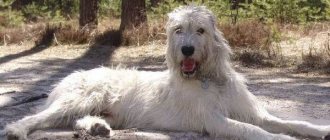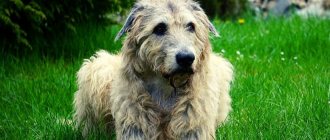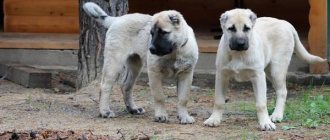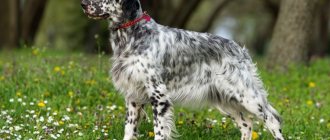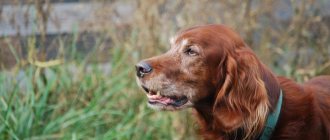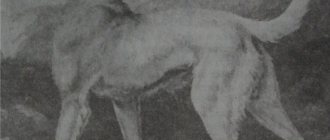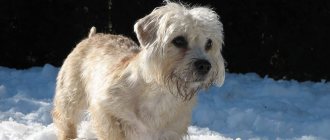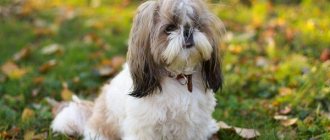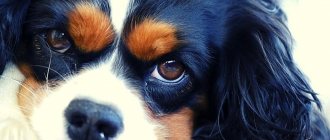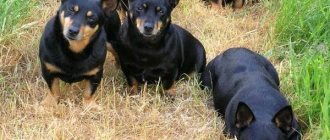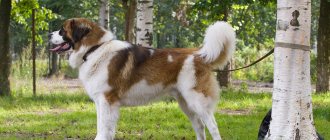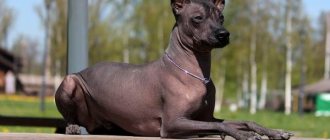History of the Irish Wolfhound breed
Irish wolfhounds are thought to be descended from Egyptian greyhounds brought to Ireland by Celtic tribes more than two thousand years ago.
And since the Celts themselves needed animals to protect livestock from wolves, when breeding them they relied on their outstanding dimensions. As a result: at the junction of the 3rd and 4th centuries. n. e. Huge greyhound-like dogs roamed freely around the island, successfully dealing with any large predator. As befits working breeds, the ancestors of Irish wolfhounds did not shine with beauty, but they struck awe with their menacing appearance and hunting acumen. So, for example, at the end of the 3rd century AD. e. The “Irish” performed in the arena of the Roman circus, where they demonstrated extraordinary prowess in a battle with a lion. As for success in the hunting field, by 1780, thanks to the forces of these shaggy giants, wolves in Ireland were completely exterminated, becoming a living exotic.
Note: for several centuries, dogs of the Irish Wolfhound breed existed in two types: smooth-haired and wire-haired. Subsequently, individuals with coarse, wiry hair replaced their counterparts as less adapted to the changeable island climate.
Irish Wolfhound puppies
From the Middle Ages until the 17th century, Irish wolfhounds enjoyed a wave of popularity. They were presented to ambassadors and eastern nobles, presented as living payment for services rendered, sending dogs to all corners of Western Europe and even Asia. Cromwell put an end to this excitement in 1652. The Lord General imposed an official ban on the export of wolfhounds from Ireland, after which they found themselves in forced isolation, which provoked the degeneration and almost complete extinction of the breed.
Since the middle of the 19th century, interest in this type of greyhound gradually revived. In particular, in 1885, the first breed club was opened in Ireland under the leadership of Captain G. A. Graham. Here, a year later, the annual Graham Transitional Shield award was approved for dogs that have retained the maximum breed characteristics of their ancestors. By the way, Graham himself, in an attempt to return the endangered race of Irish wolfhounds to the world, did not hesitate to mix the genes of Great Danes and Deerhounds into the blood of its representatives.
In the USSR, people started talking about the “Irish” in the late 80s, when several purebred sires were imported from the Polish nursery “Sagittarius”. At the same time, animals began to be exhibited in Russian rings in the early 90s, after the domestic breed gene pool was enriched with breeding individuals from Hungary, Germany and other Western countries.
"FROM THE MAGIC FOREST"
*** *** *** *** *** *** *** *** *** *** *** *** **** BARRY OF NUTSTOWN
(born 02/09/1996)
| PEDIGREE PHOTO GALLERY |
| * KELLY MARIE OF NUTSTOWN (born 02/07/1996) | |
| PEDIGREE PHOTO GALLERY |
| * CAPTAIN GRAHAM FROM THE MAGIC FOREST (born 03/15/2001) |
PEDIGREE PHOTO GALLERY |
| * MARFA BREEN (born 06/11/1993) | |
| PEDIGREE PHOTO GALLERY |
| * NIKE FROM THE MAGIC FOREST (born 01/06/1996) | |
| PEDIGREE |
| * NIGEL FROM THE MAGIC FOREST (born 01/06/1996) | PEDIGREE |
| * NEJI FROM THE MAGIC FOREST (born 01/06/1996) | PEDIGREE |
| * OLIVER TWIST FROM THE MAGIC FOREST (born November 23, 1998) | |
| PEDIGREE PHOTO GALLERY |
| * OLIVIA FAITHFUL FROM THE MAGIC FOREST (born November 23, 1998) | |
| PEDIGREE PHOTO GALLERY |
| * PANDA FROM DUMA (born 07/21/1996) | |
| PEDIGREE PHOTO GALLERY |
| * PANTAGRUEL FROM THE MAGIC FOREST (born 04/09/1999) | |
| PEDIGREE |
| * PERSEUS FROM THE MAGIC FOREST (born 04/09/1999) |
| PEDIGREE PHOTO GALLERY |
| * PEACOCK FROM THE MAGIC FOREST (born 04/09/1999) | |
| PEDIGREE PHOTO GALLERY |
| * PATRICIA FROM THE MAGIC FOREST (born 04/09/1999) |
| PEDIGREE PHOTO GALLERY |
| * PRINCESS TURANDOT FROM THE MAGIC FOREST (born 04/09/1999) | |
| PEDIGREE PHOTO GALLERY |
| * RATIBOR FROM THE MAGIC FOREST (born 03/05/1997) | PEDIGREE |
| * REGINA FROM THE MAGIC FOREST (born 03/05/1997) | |
| GENEALOGY PHOTO ALBUM |
| * RADMILA FROM THE MAGIC FOREST (born 03/05/1997) | PEDIGREE |
| * RUSSIAN VITYAZ FROM THE MAGIC FOREST (born May 14, 2001) | |
| PEDIGREE PHOTO GALLERY |
| * ROBIN HOOD FROM THE MAGIC FOREST (born May 14, 2001) | |
| PEDIGREE PHOTO GALLERY |
| * RICHARD THE LIONHEART FROM THE MAGIC FOREST (born May 14, 2001) | |
| PEDIGREE PHOTO GALLERY |
| * ROMANTIC FROM THE MAGIC FOREST (born May 14, 2001) | |
| PEDIGREE PHOTO GALLERY |
| * ROSINKA FROM THE MAGIC FOREST (born May 14, 2001) | |
| PEDIGREE PHOTO GALLERY |
| * RUSSIAN BEAUTY FROM THE MAGIC FOREST (born May 14, 2001) | |
| PEDIGREE PHOTO GALLERY |
| * MY DELIGHT FROM THE MAGIC FOREST (born May 14, 2001) | |
| PEDIGREE PHOTO GALLERY |
| * RAMONA FROM THE MAGIC FOREST (born May 14, 2001) | |
| PEDIGREE PHOTO GALLERY |
| * SIR LANCELOT FROM THE MAGIC FOREST (born 07/14/2001) | |
| PEDIGREE PHOTO GALLERY |
| * GLORIOUS VIKING FROM THE MAGIC FOREST (born 07/14/2001) | |
| PEDIGREE PHOTO GALLERY |
| * SCYTHIAN WARRIOR FROM THE MAGIC FOREST (born 07/14/2001) | PEDIGREE |
| * SNOW KNIGHT FROM THE MAGIC FOREST (born 07/14/2001) | |
| PEDIGREE PHOTO GALLERY |
| * SAGA OF LOVE FROM THE MAGIC FOREST (born July 14, 2001) | |
| PEDIGREE PHOTO GALLERY |
| * SOLVEIG FROM THE MAGIC FOREST (born July 14, 2001) | |
| PEDIGREE PHOTO GALLERY |
| * SUN FAIRY FROM THE MAGIC FOREST (born 07/14/2001) | |
| PEDIGREE PHOTO GALLERY |
| * SNOW QUEEN FROM THE MAGIC FOREST (born 07/14/2001) | |
| PEDIGREE PHOTO GALLERY |
| * TOM SAWYER FROM THE MAGIC FOREST (born May 23, 2001) | PEDIGREE |
| * TOREADOR FROM THE MAGIC FOREST (born May 23, 2001) | |
| PEDIGREE PHOTO GALLERY |
| * SECRET AGENT FROM THE MAGIC FOREST (born May 23, 2001) | PEDIGREE |
| * THE SECRET OF THE CELTS FROM THE MAGIC FOREST (born May 23, 2001) | PEDIGREE |
| * TUTTI FRUTTI FROM THE MAGIC FOREST (born May 23, 2001) | |
| PEDIGREE PHOTO GALLERY |
| * TERPSICHORA FROM THE MAGIC FOREST (born May 23, 2001) | |
| PEDIGREE PHOTO GALLERY |
| * TARANTELLA FROM THE MAGIC FOREST (born May 23, 2001) | |
| PEDIGREE PHOTO GALLERY |
| * WILFRED IVANHOE FROM THE MAGIC FOREST (born 03/08/2003) | |
| PEDIGREE PHOTO GALLERY |
| * ULAN FROM THE MAGIC FOREST (born 03/08/2003) | PEDIGREE |
| * CLEVER MARKUS FROM THE MAGIC FOREST (born 03/08/2003) | |
| PEDIGREE PHOTO GALLERY |
| * GOOD GUY FROM THE MAGIC FOREST (born 03/08/2003) | PEDIGREE |
| * URFIN DJUS FROM THE MAGIC FOREST (born 03/08/2003) | |
| PEDIGREE PHOTO GALLERY |
| * SMILE OF FORTUNE FROM THE MAGIC FOREST (born 03/08/2003) | |
| PEDIGREE PHOTO GALLERY |
| * ULA FROM THE MAGIC FOREST (born 03/08/2003) | |
| PEDIGREE PHOTO GALLERY |
| * SMART SMART FROM THE MAGIC FOREST (born 03/08/2003) | |
| PEDIGREE PHOTO GALLERY |
| * FANFAN LA TULIPE FROM THE MAGIC FOREST (born 12/04/2003) | |
| PEDIGREE PHOTO GALLERY |
| * FRANT MUSICIAN FROM THE MAGIC FOREST (born December 4, 2003) |
|
| * FLIBUSTER FROM THE MAGIC FOREST (born December 4, 2003) |
|
| * DREAMER FROM THE MAGIC FOREST (born December 4, 2003) | |
| PEDIGREE PHOTO GALLERY |
| * FIGARO FROM THE MAGIC FOREST (born December 4, 2003) | |
| PEDIGREE PHOTO GALLERY |
| * FINIST CLEAR FALCON FROM THE MAGIC FOREST (born 12/04/2003) | |
| PEDIGREE PHOTO GALLERY |
| * FANTASY OF THE CELTS FROM THE MAGIC FOREST (born 12/04/2003) | |
| PEDIGREE PHOTO GALLERY |
* FLOWER FAIRY FROM THE MAGICAL FOREST (born 12/04/2003) * FIONNA FROM THE MAGICAL FOREST (born 12/04/2003) * FREYA FROM THE MAGICAL FOREST (born 12/04/2003)
| * HAGRID FROM THE MAGICAL FOREST (born December 18, 2003) | |
| PEDIGREE PHOTO GALLERY |
* HARRY POTTER FROM THE MAGICAL FOREST (born December 18, 2003)
| * HEIMDAHL FROM THE MAGIC FOREST (born December 18, 2003) | |
| PEDIGREE PHOTO GALLERY |
| * BRAGGER FROM THE MAGIC FOREST (born December 18, 2003) | |
| PEDIGREE PHOTO GALLERY |
| * HELIOS'PHENIA FROM THE MAGIC FOREST (born December 18, 2003) | |
|
|
| * CHLOE FROM THE MAGIC FOREST (born December 18, 2003) | |
| PEDIGREE PHOTO GALLERY |
* HERMIONE FROM THE MAGIC FOREST (born December 18, 2003) Web-desing Kiryushina Irina. All rights reserved ©
Irish Wolfhound breed standard
The Irish Wolfhound is a big-chested giant, very similar to a Deerhound, but at the same time denser and stronger. The minimum permissible height for an adult male is 79 cm. Despite his impressive size, the “Irishman” does not look heavy and clumsy. On the contrary, in movement the dog reveals such ease and plasticity that it was absolutely impossible to suspect in it.
Irish Wolfhound
Head
The “Irish” skull is elongated, with an almost flat forehead and a narrowed, elongated muzzle.
Bite
The Irish Wolfhound can have a scissor bite or a straight bite, but the first option is preferable.
Eyes
The dog's eyes should be as dark as possible.
Ears
The Irish Wolfhound's ears are small, laid back, and pink in shape.
Neck
A purebred “Irish” is the owner of a long, well-muscled and somewhat arched neck with tightly stretched skin.
Irish Wolfhound muzzle
Frame
The dog's body is elongated, noticeably widening in the croup. The loin of the Irish Wolfhound is convex. The chest is developed, moderately deep, the stomach is tucked.
Limbs
The Irishman's legs are long and bony with sloping shoulder blades, elongated, muscular thighs and low hocks. The animal's paws are rounded, set straight, with well-arched toes and claws.
Tail
The tail is long, of good thickness, with a slight bend.
Wool
The dog's coat is quite hard, and the hair on the eyebrows and muzzle is wiry.
Color
Irish Wolfhounds have the same types of colors as Deerhounds, i.e. white, red, brindle, fawn, gray, black, etc.
I give up!
Possible defects
Not every Irish wolfhound fits 100% into the standard established by the breed standard, and deviations from the ideal can be either insignificant or threatening to disqualify the animal. Most often, the score at competitions is reduced for the presence of the following defects:
- light or too massive head;
- prominent forehead;
- short body of square format;
- curvature of the front legs;
- sagging or straight back;
- large or drooping ears;
- clubfoot or with splayed legs;
- short neck and dewlap on it;
- excessively narrowed or expanded chest;
- sharp bend of the tail;
- any color of the iris except black;
- light lobe;
- lips and eyelids of any shade except black;
- fragile hind legs;
- widely spaced fingers.
Photo of Irish Wolfhound
Personality of the Irish Wolfhound
One look at the Irish Wolfhound makes you think that this is a typical tough nut to crack and will not be easy to get along with. In reality, everything is exactly the opposite: any average “Irish” is insanely attached to the owner. The dog does not servile or humiliate himself, but this does not prevent the animal from cherishing communication with the person who took him into his home. In addition, dogs of the Irish Wolfhound breed masterfully control their own aggression, reserving this quality for a serious opponent and never using it against someone who is obviously weaker. So feel free to leave your children in the care of your pet: he will approach the matter with all responsibility and caution.
Irish Wolfhound plays with a cat
Since the ancestors of the “Irish” always hunted wolves and never people, turning these good-natured giants into suspicious bodyguards will be problematic. Even towards strangers, Irish wolfhounds are quite peaceful if they do not emit too obvious a threat. But the shaggy “thugs” have difficulty establishing contacts with other animals. And if the wolfhound still agrees to tolerate the presence of a dog of average build, then he will certainly start a conflict with some Papillon. And the point here is not so much about rivalry as about natural instincts. The Irish Wolfhound does not know the difference between a slop rat, a stray cat and a miniature dog. For him, they are all prey with which he can have good fun, and most importantly, without risk to health.
It is believed that leadership habits are alien to Irish wolfhounds, therefore, in principle, dogs should not encroach on their master’s authority. Nevertheless, the breed is distinguished by its independence and independence in decision-making, so it is better to behave seriously with its representatives, without flirting or coddling. Animals are not prone to jealousy and hiding from an Irish wolfhound in order to cuddle a cat or scratch another dog behind the ear is clearly not worth it. At the same time, shaggy giants can be very offended, reacting especially painfully to what they themselves think is an unfair punishment.
With age, the character of the Irish Wolfhound begins to change, which is generally typical for large breeds. Typically, “old people” are more capricious, touchy and irritable, and you will have to put up with this. The activity of an elderly animal also decreases, so the “Irish” who have passed the 7-year mark more often lie down in their corner, remaining undaunted wolf hunters, perhaps only somewhere deep in their souls.
Wolfhound with his beloved owner
New friend
Description
Huge dogs stand out from any other breed. The height at the withers ranges from 80 to 86 cm in males, height 71-80 cm in females. The breed standard for weight is from 55 kg for males, weight from 41 kg for females. The Irish Wolfhound has the following breed characteristics by which it can be easily recognized:
- the head is oblong, narrow, often seems disproportionately small compared to other parts of the body;
- powerful jaw, snow-white teeth, large, especially long fangs;
- eyes are round, small, usually dark in color;
- the ears are small, hanging, rose-shaped;
- the body is large, muscular, wide chest, back line is almost straight;
- the tail is long, has a slight bend;
- The paws are straight, long, and the muscles stand out well.
The body looks fit, the wolfhound is known for its athletic build. It is extremely rare to see a representative of the breed with a sagging belly; they are not prone to obesity.
Colors
The fur of the Irish Wolfhound is coarse and tough. If there is no proper care, it becomes prickly, like a wire. Its color may vary:
- Pure white color is extremely rare; a puppy with this coat color is very expensive.
- Black color. Also rare, it is usually a combination of several shades: dark blue, gray (light and dark).
- Brindle color (red). Includes several shades of red, yellow, orange.
Most often there are puppies with mixed colors, so it is difficult to determine a clear shade. Usually there are colors: beige, gray, yellow. Then, as they grow, some of them are smoothed out, others begin to predominate.
Character
The character of the Irish Wolfhound, like most large breeds, is twofold. They are very loving towards their owner and his family. A pet will always create a calm environment in an apartment or house, where comfort and harmony will reign. But when he faces an enemy, seeing a threat to his master, he becomes dangerous.
Aggression must be suppressed from a young age. The Irish Wolfhound is not a dog you can jokingly face. Its large dimensions do not prevent it from getting along at home; it adapts well to its environment. Surprisingly, the wolfhound gets along well with other pets. Owners are often surprised at how tenderly this huge dog treats tiny kittens, hamsters, and other small animals.
Huge wolfhounds are very sensitive to the attitude of the owner. They are acutely aware of any rudeness or increased tone. If they are ready to attack the enemy for this, such behavior on the part of the owner greatly offends them.
Education and training
No matter how much we would like to, we will have to abandon the idea of registering the Irish Wolfhound for the ZKS. A friendly, self-possessed character is the signature feature of the breed, and raising bodyguard dogs from its representatives is a pointless exercise. After all, that’s what Rottweilers and Caucasian Shepherds are for. Agility, frisbee and weight-pulling are more likely to cause spinal problems for the animal than to bring true pleasure, so it is better not to try such sports disciplines. But you can indulge in coursing and racing if your pet does not have heart pathologies.
Irish Wolfhound in Her Majesty's Service
OKD is vital for Irish wolfhounds, since no better method has yet been invented to instill the basics of obedience in such a large dog. And it makes no difference whether you take on the mission of training your four-legged friend or entrust the matter to a specialist. The main thing is that during the training the animal is in the mood for contact and is interested in achieving the goal. The learning process itself should be based on mutual respect. Irish Wolfhounds categorically do not accept rough treatment, so do not raise your voice when giving a command, and certainly do not start shouting. And of course, do not “rape” the animal with multiple repetitions of exercises: do 2-3 approaches and rest for an hour or two. Believe me, this method will give better results than systematically chewing the same thing.
You can accustom an Irish Wolfhound puppy to a leash from the age of 4 months, and you are allowed to let the baby run freely only when he has clearly understood the meaning of the command “Come to me!” The first walks on a leash should be short: if the animal trails after you, it means someone has gone too far with the load, and it’s time for the pet to go home and rest. By the way, about overloads: they are extremely dangerous for the young “Irishman”, and especially for his unformed skeleton.
Irish Wolfhound puppies have a very pronounced biting reflex. Children can practice their grip on toys, objects around them, and the owner’s hands, so the owner’s task is to clearly explain to the pet what can be tested and what cannot. Just don’t try to shake or hit the puppy that bit you or your child. You don’t want to raise a nervous, angry dog with a chronic complex of distrust of humans, do you? The game of cuddling, which little Irish wolfhounds love so much, is also better to nip in the bud. If the friendly pounces of a puppy are fun and pleasant, then the hugs of an adult greyhound are a pleasure for everyone, and for those who are physically strong.
Training
The purpose of the wolfhound breed is security, protection, therefore, without training you cannot raise an intelligent dog. From a young age, a puppy must clearly understand who is boss in the house and who needs to be protected. At the age of 6 to 10 months, the temperament of puppies is especially pronounced; during this period you need to be patient.
From 3-4 months, active training should begin, the purpose of which is to accustom the puppy to basic commands. Punishment for disobedience cannot be physical; this will negate all training efforts. Refusal to follow commands can result in deprivation of food. By the age of 6 months, the puppy should know well and follow commands: come to me, next to me, place, fu, other standard instructions.
Only a dog that is larger in size and strength is capable of killing an Irish Wolfhound. The owner should not have any fear of the wolfhound. If it causes fear, it is not recommended to get a puppy; it is better to choose a mini breed.
Maintenance and care
Irish with wolfhounds
There is an opinion that large Irish Wolfhounds are uncomfortable and bored in apartments and houses. In fact, the pet’s comfort depends entirely on the efforts of the owner. If you provide the dog with a spacious bed in a corner where household members will not cling to it with their feet, and walk it normally, there will be no difficulties with housing. Keep in mind that the Irish Wolfhound breed is contraindicated from lying on hard surfaces (sensitive joints + a very thin layer of subcutaneous fat), and therefore many owners allow the animals to lie on their own bed or sofa. Keeping an Irish Wolfhound in an enclosure is an extreme measure; this dog does not tolerate loneliness well and needs constant close contact with a person. If you still decide to take such a step, do not leave your four-legged friend to spend the winter in a kennel, albeit insulated. Firstly, it is cruel, and secondly, it is harmful to the health of the pet. Chaining an Irish wolfhound is also impermissible: he was not hired as a watchman.
Hygiene
The coarse fur of the Irish Wolfhound is tidied up with a metal comb and brush, which allows you to quickly and painlessly comb out dead hairs and debris collected by the animal during a walk. Theoretically, the “Irish” does not need a haircut, but in practice, most owners shorten their pet’s fur in the most dirty places - on the paws and under the tail. It is not allowed to cut the hair on the face, but it is necessary to take care of it, so as soon as the dog has eaten, the “whiskers” and “beard” should be wiped with a clean rag.
We advise you to move away from the wolfhound who is about to shake himself off
In addition to standard brushing, Irish Wolfhounds should be trimmed, but in reality this is mainly done by owners of show dogs. As a rule, it is not the entire animal that is pinched, but only the head, and it is better to do this manually, armed with a silicone fingertip. Typically, trimming begins with the ears: hair from the outer part of the ear linen is plucked until the ear becomes relatively smooth. The wedge between the eyes, going from the forehead to the skull, is also carefully trimmed, and with it the lines of the neck and cheeks. It is better to treat the dog not the day before the exhibition, but about a month and a half in advance, so that the transitions between the plucked and untreated areas are not noticeable. Some breeders practice systematic weekly trimming, or rather a simplified version of it, when only bristling hairs are removed throughout the skull. But if you are all for a natural and brutal appearance, you can neglect this rule, as a good half of the breeders do.
Irish wolfhounds are bathed infrequently - 2-3 times a year is enough, using moisturizing shampoos for wire-haired dogs such as No. 33 Coarse Coat Shampoo or Clean Coating Shampoo from “Isle of Dogs”. Cleaning the ears of an “Irishman” is no different. Once a week, the auricle is treated with veterinary lotion, removing wax and dirt from it using cotton pads and swabs. You need to monitor your eyes more carefully, wiping them every 5-7 days with chamomile infusion. But it is better not to treat eye inflammation on your own: there is a risk of making an incorrect diagnosis and causing the disease.
Caring for the claws and teeth of the Irish Wolfhound is classic: trimming the plate with a nail clipper as it grows and removing plaque with a cleaning attachment 3-4 times a month. After walks, check the skin on your pet's paw pads. If there are no visible damages, rinse the paws with warm water and dry them. If the leather is cracked, which usually happens in winter, additionally lubricate it with oil or rich cream.
Walk along the coast
Walk
To walk an Irish Wolfhound, it is more advisable to use a belt leash. Adult dogs are walked twice a day for an average of an hour (10-minute trips to the toilet do not count), puppies up to six months are taken out to “ventilate” every 3 hours for 10-15 minutes. Don’t forget, Irish Wolfhounds are energetic guys, but they are far from supermen, so overload is harmful for them.
Let your dog run freely if you are not walking near a highway and there are no live provocateurs in the form of stray cats in sight. Keep in mind that Irish wolfhounds are not allowed to jump until they are one year old, so you can start practicing acrobatic tricks in the fresh air only when your pet’s skeletal system has strengthened. If you walk your Irish Wolfhound outside the city, in groves and copses, take care of protection from ectoparasites and do not be lazy when you come home to inspect your pet’s armpits, withers and groin areas. If the “enemy” is discovered, remove it from the animal’s body and observe the behavior of your ward for the next couple of days - getting infected with piroplasmosis from a tick is as easy as shelling pears for a dog.
Feeding
Considering that the basis of a large dog’s diet should be lean meat or “dry” super-premium and holistic class, Irish Wolfhounds are not cheap for their owners. Of course, meat protein can be periodically replaced with fish protein, as well as offal, but such experiments also involve significant expenses. As for porridges, the best options for the “Irish” would be buckwheat, rice and oatmeal. At the same time, the share of cereal products in your pet’s bowl should not exceed ⅓ of the portion, the remaining ⅔ is taken up by meat and its waste.
Who here wants a cookie?
Irish Wolfhounds, as a rule, are not allergic, so their table can be varied with turkey and chicken meat. The main thing is not to completely replace beef and lamb with poultry. It is useful to include low-fat cottage cheese and kefir, pumpkin and zucchini, as well as seasonal greens in your dog’s menu. Potatoes are acceptable in the Irish Wolfhound's diet, but only occasionally and in small quantities. Be careful with bones: it is better not to give them to 4-month-old babies at all, so as not to damage the teeth. But for one-year-old teenagers, it will be useful to indulge in a piece of veal backbone - they will receive a portion of natural collagen and will train their grip on the lower jaw. For adult and elderly dogs, it is more advisable to replace bones with less hard treats from the pet store: they do not have such a detrimental effect on tooth enamel and do not cause constipation.
Important: to avoid stomach volvulus after a meal, the Irish Wolfhound must lie down for 1.5-2 hours, although often a well-fed animal is eager to play. The owner’s task is to teach the dog to rest after each meal, without reminders.
Irish Wolfhound puppies grow very rapidly, which is why inexperienced owners often increase the baby’s rations. This is fundamentally wrong. The young “Irishman” must eat strictly according to the diet designed for large breed puppies, otherwise you risk simply fattening him up. Of course, a well-fed wolfhound looks much prettier than its lean counterparts, but its musculoskeletal system will definitely not be happy with the extra pounds.
Vitamin complexes and dietary supplements are a mandatory item on the menu of an Irish wolfhound that eats “natural” food. Particular attention is paid to preparations with glucosamine and chondroitin, which support the ligaments and joints of the animal in working condition. If you need to work on improving your dog’s coat, take a closer look at complexes with Omega 3, 6 and 9.
Feeding frequency:
- from 1 to 3 months – 4-5 times a day;
- from 3 to 6 months – 3 times, with an interval between feedings of 5 hours;
- from 6 months - 2 times a day, but if the puppy is weak, you can continue feeding three times a day for up to a year.
Growing friendship is not a hindrance
Pros and cons of the breed
Like any breed, the Irish Wolfhound has advantages and disadvantages:
| + | – |
| Gets along with other pets | Requires mandatory training, becomes aggressive without training |
| Does not require frequent bathing | If you do not demonstrate authority in the first months, he considers himself the master |
| Has an athletic build | The coat requires constant brushing |
| Has high speed - quickly runs to help | Requires special nutrition in the first year of life |
| Feels comfortable in the house or enclosure | Short lifespan |
Health and Diseases of Irish Wolfhounds
Indomitable on the outside, inside Irish wolfhounds remain quite fragile creatures with a short life expectancy (only 6-8, rarely 10 years) and a predisposition to a wide range of diseases.
Ailments of representatives of this breed:
- dislocation of the kneecap;
- hypothyroidism;
- hip dysplasia;
- pyoderma (purulent skin lesion);
- cataract;
- entropy (inversion of the eyelid);
- osteosarcoma;
- Wobbler syndrome (a disorder of the central nervous system, which results in compression of the cervical spine);
- hygroma of the elbow joint;
- dilated cardiomyopathy;
- von Willebrand disease (blood clotting pathology);
- osteochondrosis of the shoulder;
- bloating/volvulus.
Health and life expectancy
The lifespan of wolfhounds is 5-6 years. Considering how long similar breeds live, this figure is considered low. Health largely depends on genetics. Common Irish Wolfhound diseases often cause death:
- volvulus of the intestines, stomach;
- vascular bleeding (von Willebrand pathology);
- spinal cord deformity;
- hormonal disorders;
- heart disease;
- dysplasia, other ailments of the musculoskeletal system.
Most diseases are provoked by the large size of the animal. Internal organs and body systems cannot cope with the heavy load.
How to choose a puppy
Mom with puppy
- Irish Wolfhound males are open and straightforward, which cannot be said about females. So when getting acquainted with the breed for the first time, stop at the “boy”, it’s easier to work with him.
- To study the character of your pet, choose a fully grown puppy, not a two-month-old puppy. Too young “Irish” people have little individuality, so they are all equally cute and funny.
- Don’t avoid getting to know the baby’s mother and father in order to see the pet’s development prospects.
- Appreciate the atmosphere in the nursery. Dirty, cramped cages, apathetic puppies with signs of rickets, the refusal of the breeder to demonstrate at least one of the sires indicate that here they are simply making money on dogs.
- Inquire about the age of the bitch whose puppies are being offered to you, and refuse to purchase if a litter from a 7-year-old “grandmother” is for sale.
- Look at the veterinary passport of the Irish Wolfhound puppy, which should contain notes on age-appropriate vaccinations.
- A responsible breeder always tests the litter for at least some of the genetic diseases, so if the nursery offers customers a look at the results of animal examinations, this is a plus for the institution’s karma.
- Buy 6, or better yet, 12-week-old puppies and discard 5-week-old babies taken from the bitch too early.
- The cost of an Irish Wolfhound puppy has nothing to do with its color. If a seller tries to inflate the price tag for a unique shade of wool, he is simply being cunning.
- When purchasing an older puppy, ask the breeder if the wolfhound is familiar with a leash and what commands it knows. With experienced specialists, “teenagers” are socialized, obedient and respond to certain commands.
Choosing a puppy
When deciding to buy an Irish Wolfhound puppy, weigh your options: do you have enough strength, money, experience and patience to raise him into a healthy, properly raised dog? Assess the heredity of the chosen baby, inquire about the genetic tests of his parents, living and growing conditions.
The puppy's heredity is the first question that you should clarify as much as possible
Several Russian nurseries are engaged in breeding this breed. It is here, and not through dubious advertisements, that you should buy a dog. Depending on the breed level, the price of a puppy ranges from 40 to 80 thousand rubles.
Wolfhound puppies are adorable in their clumsiness
Be guided when choosing not only by emotions, but also by common sense - pay attention to several important points in the exterior of your future pet:
- on the head - the structure of the skull in this breed is distinguished by smooth lines, there are no pronounced cheekbones, feet, etc.;
- on the paws - in a real Wolfhund, the pads of the toes are tightly gathered together, and not loose;
- on the coat - it is unique both in appearance and to the touch (even a puppy’s coat should resemble wire, hard, rough and prickly).
And a true Irishman can always be identified by his proud disposition - even in the breed standard it is noted that these dogs must carry their neck and head high and with dignity.
